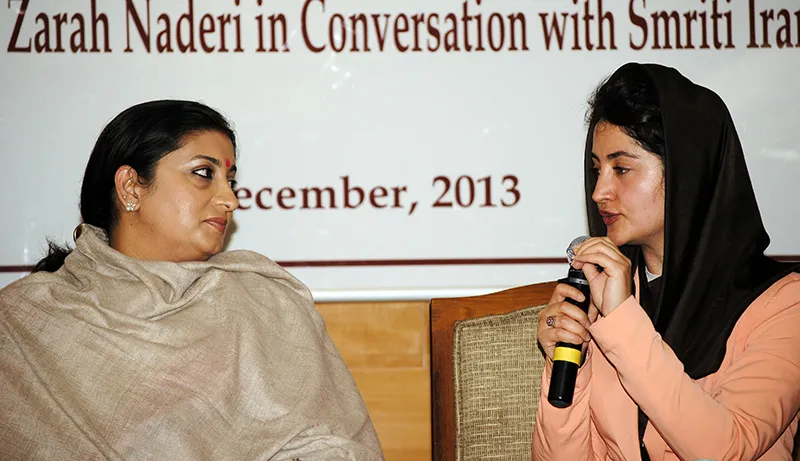-
CENTRES
Progammes & Centres
Location
Comparing Afghanistan and the rest of the world, Farkhunda Zarah Naderi, Member of the Afghan National Assembly, said that while the world is looking forward to achieve the status quo, Afghans are still fighting for their primary rights, be it women's, cultural or ethical.

The issue of women rights has been intensely debated, especially in the Indian context. On 19 December, Observer Research Foundation in association with Asia Society, India centre and the Canadian High commission organised a discussion in which the issue of women empowerment in Afghanistan was critically examined and the comparative situations and future prospects were also considered. The conversation was between Smriti Irani, the Member of Indian Parliament, and Farkhunda Zarah Naderi, Member of the Afghan National Assembly.
Naderi talked about the relationship between India and Afghanistan beyond their governments, that is, the common culture, art, and most essentially the understanding to work on common grounds.
Smriti Irani began the dialogue by pointing out the portrayal of Afghani women in front of the Indian policy makers. To this, Naderi responded by depicting the ’hidden courage’ of Afghani women, women who are continuously fighting by getting involved in politics, and raising the voice for their rights. She enunciated that in a male-dominated society, if Article 22 of the Afghanistan Constitution talks about both men and women as being citizens, that is a great success. The law that was ratified by the President to eliminate violence against women was a great achievement for Afghanistan.
Naderi further talked about the reduction of the quota for women in the national assembly from 25% to 20%. She insisted that the constitution gives lots of opportunities for the women to grow but the problem arises with the implementation. The lower house of the parliament of Afghanistan offers 25% quota reservation to the women but not the upper house, which instead of empowering women creates more challenges for them. Article 22 which talks about the primary rights of women like the age for marriage and right to education was initially rejected under male dominance. The politically active women fought between the joint commission of senate and lower house and they successfully managed to bring back the article back in the constitution, though with a decrease in the quota percentage.
The Member of the Parliament of Afghanistan agreed with Smriti Irani’s opinion that the mind set of women that they can compete in the elections and they can grow stronger need to be emphasised. Naderi said that it is essential to constantly remind men that they get votes from both genders to make them responsible to fight for women’s rights. Another part which would be influential is the public awareness not only in women but also in men.
Smriti Irani then raised the question about the uncertainty in elections in 2014 in Afghanistan and the impact of this ambiguity for a common Afghani. To this, Naderi, who agreed with the view that the Constitution of Afghanistan is not the best constitution in the world from the perspective of the 21st century citizen, asserted that parliamentary elections, if successful, will allow democracy to grow in the roots of Afghan community. She emphasised that the Bilateral Security Agreement between Afghanistan and U.S. will bring certainty among the people of Afghanistan. It will assure people that the international community is with them. Talking about the responsibilities of the public figures like the Member of Parliament, politicians and civil society, she insisted that they need to encourage people by making sure that no incorrect message from the past is being sent to the people.
The discussion then turned towards the specific strategy of politicians to draw women and youth to participate in the elections in Afghanistan. Naderi stressed the importance of making the environment friendly so that a woman does not feel challenged when she comes to vote. About the role of media in Afghanistan politics, the Afghan MP said that media needs to keep a balance. When the media shows one side of the story, it depreciates the achievements Afghanistan has attained. Media should be a fair spectator and support women in fighting against challenges.
Comparing Afghanistan and the rest of the world, Naderi said that while the world is looking forward to achieve the status quo, Afghans are still fighting for their primary rights, be it women’s, cultural or ethical. She stressed that patience and courage are the keys to bring Afghanistan to the 21st century from the 5th century.
Naderi concluded by assuring that there is a lot of hope for the young in Afghanistan. The youth of Afghanistan covers 68% of the total population and has been the backbone of the country for the last 12 years of democracy.
(This report was written by Arushi Sharma, Research Intern, Observer Research Foundation)
The views expressed above belong to the author(s). ORF research and analyses now available on Telegram! Click here to access our curated content — blogs, longforms and interviews.